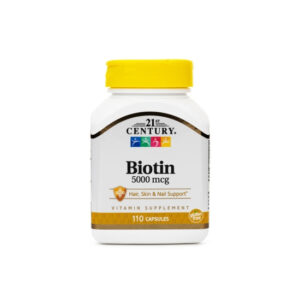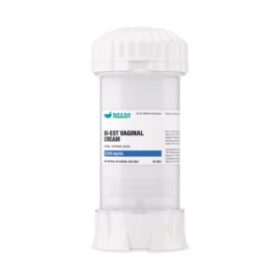Biotin Capsule (Each) †
Biotin Tablet (Each) †
† commercial product
A dietary element vital for carbohydrate, fat, and amino acid metabolism, biotin (vitamin H; coenzyme R; categorized as a B vitamin) Mostly in muscle, kidney, and liver it is found. Five carboxylases that catalyze phases in fatty acid, glucose, and amino acid metabolism rely on biotin as an important cofactor. Furthermore, it is a key player in cell signaling, gene regulation, and histone modifications.
Naturally present in a few meals and used as a dietary supplement, biotin is a watersoluble B vitamin. For the metabolism of carbohydrates, fats, and amino acids, it is critical. Five carboxylases that mediate stages in fatty acid, glucose, and amino acid metabolism depend on biotin as an indispensable cofactor. In foods like organ meats, eggs, nuts, and soybeans it is mostly proteinbound. Through proteolysis, gastrointestinal enzymes degrade ingested biotin. This produces biocytin, which biotinidase then splits into free biotin and lysine. In the little intestines, free biotin is finally absorbed. Given its crucial part in metabolism, biotin can be utilized for metabolic problems including biotinidase, holocarboxylase synthetase, and isolated carboxylase enzyme deficiencies. from fatty acids, glucose, and amino acids.
Higher biotin dosages (i.e., 10 to 300 mg biotin/day) in dietary in patients who are having blood or other samples taken in dietary Among supplements that can produce clinically significant erroneous lab test results (falsely high or falsely low) include multivitamins, prenatal vitamins, and supplements for hair, skin, and nails growth. in tests utilizing biotin-streptavidin technology, low outcomes). One death and other bad occurrences linked to biotin interference with laboratory tests have been noted. Particularly, biotin lab interference has led to erroneously low troponin readings, which might result in missed diagnoses and possible major clinical consequences. With patients, go over dietary supplement use—especially those that could include biotin—and alert the lab running tests if the patient says they are taking biotin. containing supplements. If the lab test result does not match the clinical presentation, think laboratory test interference from biotin as a possible cause of error. To the FDA and the lab test maker, report any side effects believed to be caused by biotin interference from the patient. One patient Within three days of quitting biotin supplementation, repeated TFTs were normal; reportedly had unusual thyroid function tests (TFTs) that did not match the clinical context. Biotin was then given to the same patient, and TFTs done 16 hours after the last dose and after an overnight fast revealed more evidence of biotin immunoassay interference.
Biotin should be consumed at the recommended appropriate intake (AI) during pregnancy. Usually, if a nutritious diet is followed and no deficiencies have been identified, supplementing beyond dietary intake is not required.
Women breastfeeding may ingest biotin at levels within the recommended adequate intake (AI) range. Normally, supplementation beyond diet intake is not required if one eats a balanced diet and no deficiency has been identified.
Phenobarbital (Moderate) usage for more than a year while biotin is taken may result in lower biotin concentrations. Anticonvulsants that are Powerful CYP3A4 inducers like phenobarbital are thought to boost biotin metabolism, which lowers biotin levels and inhibits intestinal biotin absorption. This could lower biotin’s effectiveness. Consult with patients concurrently using these drugs about their biotin level.
( Moderate) Use of phenobarbital for longer than one year while taking biotin can cause lower biotin levels. Anticonvulsants are Strong CYP3A4 inducers like phenobarbital are thought to improve biotin metabolism, hence lowering biotin levels and inhibiting intestinal biotin absorption. Talk with patients also on these drugs regarding their biotin levels.
Carbamazepine: ( Moderate) Carbamazepine usage for more than one year while ingesting biotin can cause lower biotin levels. Strong CYP3A4 inducers like carbamazepine are believed to increase biotin metabolism, hence lowering biotin levels and suppressing intestinal biotin absorption. This can cause biotin to lose some of its effectiveness. With patients on these drugs at the same time, go over biotin status.
Ethanol: (Moderate) Overconsumption of ethanol (e.g., alcoholism) can cause more magnesium to be excreted in the urine. While taking magnesium salts, steer clear of large ethanol doses.
Moderate use of fosphenytoin for more than a year while using biotin can cause reduced biotin levels. Powerful CYP3A4 inducer anticonvulsants, Are believed to enhance biotin metabolism like fosphenytoin, hence lowering biotin levels and preventing absorption of intestinal biotin. This may impair the effectiveness of biotin. Share biotin status with patients taking these medications together.
Phenobarbital: (Moderate) Longer than one year of use of phenobarbital while also taking biotin may cause lower biotin levels. Powerful CYP3A4 inductants like phenobarbital are thought to boost biotin metabolism, therefore lowering biotin levels and inhibiting intestinal absorption of biotin. This may reduce the effectiveness of biotin. Talk about biotin levels with patients who are also on these medications.
Even when taken in large amounts, biotin has rarely been associated with any harmful side effects. There is only one reported case where an elderly woman developed a life-threatening condition called eosinophilic pleuropericardial effusion after taking 10 mg of biotin and 300–500 mg of pantothenic acid daily for two months.
Recommended sufficient intake (AI) of biotin during pregnancy is advisable. Generally speaking, outside of nutritional intake, supplementation is not needed if a good diet is followed and no deficiency has been detected.
Women nursing can eat biotin inside the advised adequate intake (AI) limits. Usually not required is supplementation outside of dietary consumption if a good diet is eaten and no deficiency has been discovered.
Store this medication at 68°F to 77°F (20°C to 25°C) and away from heat, moisture and light. Keep all medicine out of the reach of children. Throw away any unused medicine after the beyond use-date. Do not flush unused medications or pour down a sink or drain.
- Office of Dietary Supplements. Biotin fact sheet for health professionals. September 2018. Internet version, retrieved June 24, 2019. Available on the World Wide Web at: https://ods.od.nih.gov/factsheets/Biotin-HealthProfessional/– LinkOpens in New Tab
- Standing Committee on the Scientific Evaluation of Dietary Reference Intakes-Panel on Folate, Other B Vitamins, and Choline and the Subcommittee on Upper Reference Levels of Nutrients, Food and Nutrition Board, Institute of Medicine (IOM). Dietary Reference Intakes for Thiamine, Riboflavin, Niacin, Vitamin B6, Folate, Vitamin B12, Pantothenic Acid, Biotin and Choline. 1999, 2000. The National Academy of Sciences Press, Washington DC.
- US Food and Drug Administration (FDA). FDA Safety Communication: Update: The FDA warns that biotin may interfere with lab tests.
- Elston MS, Sehgal S, Toit SD, et al. Factitious graves’ disease due to biotin immunoassay interference – a case and review of the literature. J Clin Endocrinol Metab 2016;101(9):3251-3255.
- Fawcett WJ, Haxby EJ, Male DA. Magnesium: physiology and pharmacology. Br J Anaesth 1999;83:302-20.
- Fleming M, Mihic SJ, Harris RA. Ethanol. Gilman AG, Hardman JG, Limbird LE, (eds.) In: Goodman and Gilman’s The Pharmacological Basis of Therapeutics. 10th ed., New York, McGraw-Hill Companies. 2001:429-445.





